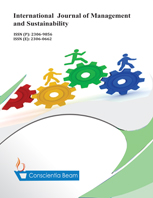Controlling social problems and environmental changes through sustainability: Evidence from Indonesian beverage companies
DOI:
https://doi.org/10.18488/11.v13i2.3649Abstract
The purpose of this study was to better understand how businesses anticipate reducing societal resentment and environmental change as a result of exploitative activities that damage the environment. The present study used a qualitative descriptive methodology to investigate the operational sustainability practices within beverage companies. The researchers employed Nvivo qualitative data analysis software, specifically version R 1.6.1, to effectively organize the interview data. This study demonstrates that CSR program execution does not solely rely on donations, which really makes the community dependent on the assistance given. The business has taken steps to carry out CSR in a sustainable way in order to promote community welfare and environmental sustainability in the future. In conclusion, this company has completed fifteen of the United Nations' (UN) sustainable development goals (SDGs). In order for stakeholders to properly reap the rewards of CSR, this research can offer an overview of the procurement of CSR programs for other companies. This study can provide an overview of the procurement of CSR programs for other companies so that the CSR received by stakeholders really feels beneficial. This study provides additional insight for subsequent researchers in the form of findings and information on the topic of CSR implementation, but the object studied is different.

